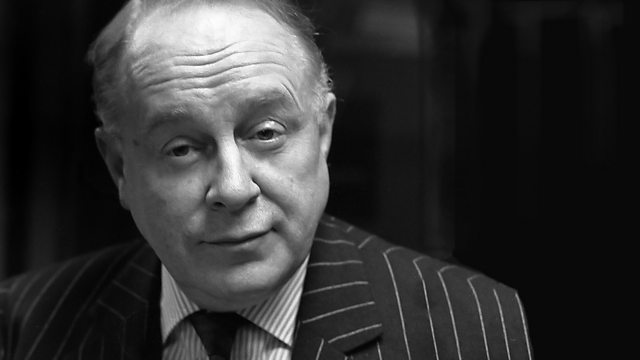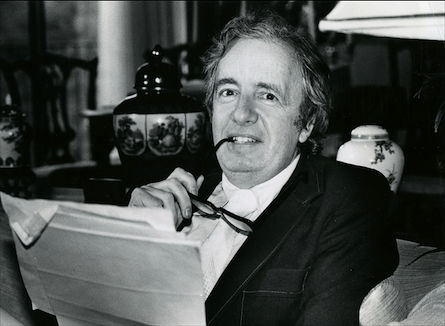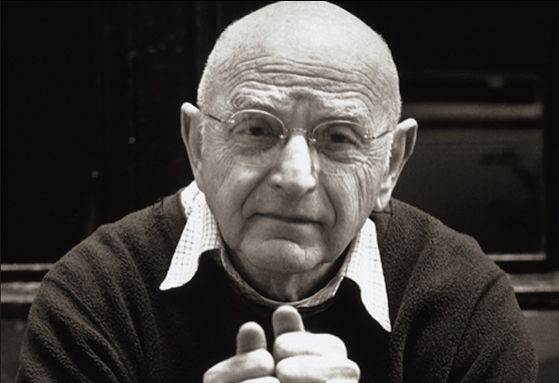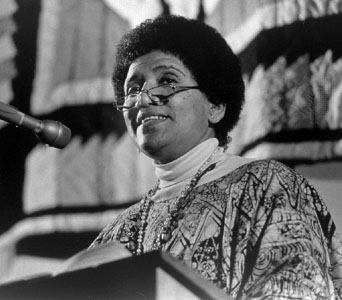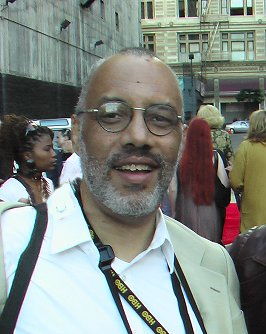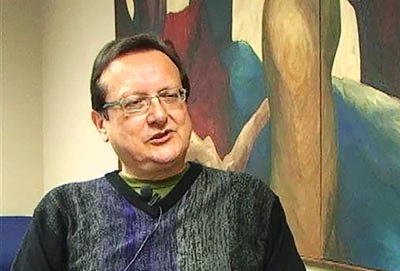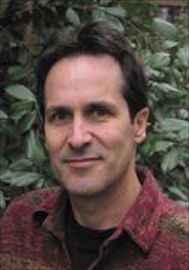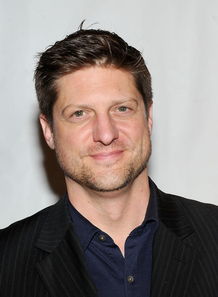|
presents THIS DAY IN GAY HISTORY based on: The White Crane Institute's 'Gay Wisdom', Gay Birthdays, Gay For Today, Famous GLBT, glbt-Gay Encylopedia, Today in Gay History, Wikipedia, and more …
Collected by Ted February 18 [{(o)}]|[{(o)}]|[{(o)}]|[{(o)}]| [{(o)}]|[{(o)}]
1854 – Alabama is the first state in the nation to make conviction of the "crime against nature" a specific grounds for divorce.

1907 – Billy De Wolfe, American actor, born William Jones (d.1974); A character actor, he was active in films from the mid-1940s until his death and was a good friend of Doris Day. He was never married, and is generally believed to have been a homosexual. He signed with Paramount Pictures in 1943 and became a reliable comedian. His pencil-mustached and often pompous character contrasted humorously with the films' romantic leads. His best-known role of his Paramount tenure is probably the ham actor turned silent-movie villain in the 1947 fictionalized Pearl White biography The Perils of Pauline. De Wolfe became known for his portrayal of fussy, petty men ("Never touch!," he would say imperiously whenever someone accosted him physically). A New York Times review of his 1948 film Isn't It Romantic? strongly criticized the way the other actors' material limited their performances, contrasting their performances with his: "But Mr. De Wolfe is nothing daunted. He rips up the place with great delight. The material is at his mercy. Likewise the scenery. And he chews it to bits." He appeared regularly in guest roles on television, including the first two episodes of NBC's The Imogene Coca Show. He reappeared as Mr. Jarvis on CBS's The Doris Day Show, and co-starred with Larry Storch in a short-lived TV sitcom, The Queen and I. He often appeared on talk shows and in TV commercials, doing his "Mrs. Murgatroyd" drag routine. Wearing a hat and a shawl (but still sporting his mustache!), DeWolfe (as old maid "Phoebe Murgatroyd") would claim to be an expert on romance, and answered questions from the lovelorn. Generations of TV viewers know Billy DeWolfe only by his voice: his is the voice of the frustrated magician in the Christmas perennial Frosty the Snowman. DeWolfe gave the role his usual fussy diction: "Mess-y, mess-y, mess-y! Bus-y, bus-y, bus-y!"
1931 – Edward George Sherrin, better known as Ned Sherrin, was an English broadcaster, author and stage director (d.2007). But more than that he was he was a humorist, anecdotalist, raconteur, impresario, producer, presenter, playwright, and actor - a veritable renaissance man. Sherrin was born in Somerset, a million miles away from the theatrical and broadcasting world he came to embody. His father ran a farm and Sherrin confessed he didn't like getting his hands dirty. National Service took him away from the milking and his subsequent time at Oxford gave him his first real taste of the theatre, first in serious drama, later in revue. After gaining a law degree, he trained as a barrister and was called to the bar in 1955. But any thought of a legal career was soon banished when an old friend he met in the street offered him a producer job at Associated Television. In his autobiography, Sherrin wrote: 'In a long career of happy accidents, perhaps the most useful was to have been born in 1931 and to complete National Service, Oxford and bar exams precisely in time for the opening of commercial television.' Commercial television gave him his break, but the BBC made Ned Sherrin's name. In 1962 came That Was The Week That Was (TW3) which contained not only satire but also serious interviews, sketches and music too. Sherrin said the format came about as a way of combining 'the two things that I'd always enjoyed most - which were a lively interest in current affairs and a terrible fascination for vaudeville, musicals and old jokes'. Hosted by a young David Frost, the show was to prove controversial in the way it poked fun at politicians not used to such irreverence. It became essential Saturday night viewing for some 12 million people. The show was taken off after two years - it had proved too contentious, especially with an election approaching. Sherrin then turned his attention to writing, producing and directing for the stage and screen, often in collaboration with the writer and critic, Caryl Brahms. He produced several West End plays and musicals including I Gotta Shoe and The Mitford Girls. He also directed the highly successful Side By Side by Sondheim and Keith Waterhouse's Jeffrey Barnard is Unwell with Peter O'Toole in the title role. On screen, he directed The Virgin Soldiers, Up Pompeii and The National Health among others. Sherrin's great store of funny stories made him ideally suited to radio programmes such as BBC Radio 4's Loose Ends, which he presented between 1986 and December 2006, and music quiz Counterpoint. Asked once about the worst aspect of his radio career, he said: 'I can't think of a bad thing about it. If I wasn't being paid for it I would be doing it as a hobby.' Openly gay, he was a patron of the London Gay Symphony Orchestra. He died of complications of throat cancer on 1 October 2007, aged 76.
1931 – Charles Higham (d.2012) was an English author, editor and poet. Higham was a recipient of the Prix des Créateurs in 1978 and of the Académie Française and the Poetry Society of London Prize.He is best remembered as the writer of sensationalist biographies, especially Errol Flynn: The Untold Story. Born in London, Higham was the son of MP and advertising mogul Sir Charles Higham. The younger Higham published two early books of verse in England, before moving to Sydney, Australia in 1954, where at 23 he became a prominent book and film critic. He became literary editor of The Bulletin, the country's leading weekly, in 1964, and published three more collections of verse. Higham was named Regents Professor by the University of California, an honor accorded to leading literary figures in foreign countries, and while at UC Santa Cruz he discovered the lost footage of It's All True, Orson Welles's uncompleted Latin American triptych. In The Films of Orson Welles (1970) and in Orson Welles: The Rise and Fall of an American Genius (1985), he argued that Welles suffered from a "fear of completion" that led him to abandon projects when they were nearly finished because he could not bear to complete them. Friends of Welles, in particular Peter Bogdanovich, criticised this thesis. Newsweek devoted a full-page spread to Higham as a film detective and The New York Times engaged him as its Hollywood feature writer for the Sunday theatre Section. Higham's first best seller was Kate (1975), the first authorised biography of Katharine Hepburn. This success was followed by Bette, the Life of Bette Davis, a biography of Lucille Ball, and The Duchess of Windsor (1988, 2005). His book Howard Hughes became the basis of Martin Scorsese's film The Aviator (2004). In this work "his assertions that Hughes had a romance with Cary Grant, was centrally involved in Watergate, offering material assistance to some of the conspirators, and quite possibly died of AIDS all raised eyebrows in the news media." In 1980, Higham's "most sensational work", Errol Flynn: The Untold Story appeared. In this work he alleged that Errol Flynn was a bisexual fascist sympathiser who spied for the Nazis before and during World War II and had affairs with Tyrone Power, Howard Hughes, and Truman Capote. Tony Thomas, in Errol Flynn: The Spy Who Never Was (1990) and Buster Wiles in My Days With Errol Flynn: The Autobiography of a Stuntman (1988) attacked Higham's claims as fabrications, a claim substantiated by viewing the F.B.I. documents, which were altered - rather than quoted verbatim - by Higham. In his autobiography Higham wrote of his molestation by his stepmother and reveals his 1952 marriage despite his growing awareness of his homosexuality. He and his wife Norine Lillian Cecil stayed great friends although she later adopted a lesbian lifestyle. Higham lived with his partner Richard V. Palafox, a nurse, until Palafox's death in 2010, in Los Angeles. Higham died on 21 April 2012 in Los Angeles.
1932 – Duane Michals is an American photographer. Largely self-taught, his work is noted for its innovation and artistry. Michals' style often features photo-sequences and the incorporation of text to examine emotion and philosophy, resulting in a unique body of work. In 1958 while on a holiday in the USSR he discovered an interest in photography. The photographs he made during this trip became his first exhibition held in 1963 at the Underground Gallery in New York City. Duane Michals settled in New York in the late 1950s and became known as a commercial and fashion photographer. For a number of years, Michals worked in commercial photography, working for Esquire and Mademoiselle, and he covered the filming of The Great Gatsby for Vogue (1974). He did not have a studio. Instead, he took portraits of people in their environment, which was a contrast to the method of other photographers at the time, such as Avedon and Irving Penn. In 1968 Michals was hired by the government of Mexico to photograph the 1968 Olympic Games. In 1970 his works were shown at the Museum of Modern Art, New York. His early work became well known for its insistent, and often humorous, use of the narrative series. Many such works actually incorporated handwritten text onto the images. Thematically, Michals has a recurrent fascination with making tangible the intangible realm of love, death, dreams, and wishes. His works deal with human sexuality, both straight and gay, but always in a charmingly moving and innocent manner. Though he has not been involved in gay civil rights, his photography has addressed gay themes. As early as 1970, Michals plotted the psychic terrain of urban gay life with his series Chance Meeting, in which two men are seen to cruise each other within the sharply receding space of an alley that communicates both the encounter's intensity and also its potential for alienation. 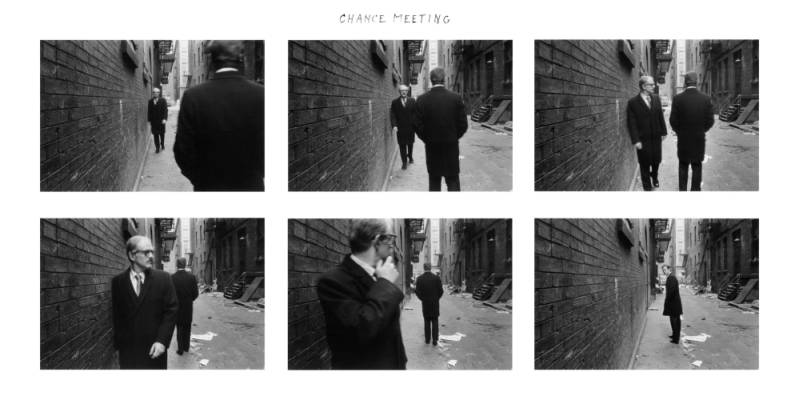 "Chance Meeting" (Click for larger) The Unfortunate Man (1978) allegorizes the crippling personal effects of gay criminalization, combining photographic image and coarsely handwritten text in what would become Michals's distinctive style. His frequent incorporation of textual elements is not only Michals's accounting for reality beyond the visible world, but also his unassuming participation in the gay literary tradition that occasioned two books of photographic homages: Homage to Cavafy (1978) and Salute, Walt Whitman (1996). (Among Michals's two dozen books and catalogues, there is also a tribute to René Magritte, with whom Michals shared a fondness for sophisticated visual humor.) With the publication of his illustrations of ten homoerotic poems by Constantine Cavafy, Michals identified himself publicly as gay, and thereafter one finds in his works images of tremendous tenderness between men, for example, Just to Light His Cigarette Was a Pleasure (1978) and How Nice to Watch You Take a Bath (1986). In 1976 Michals received a grant from the National Endowment for the Arts. Michals also produced the art for The Police album Synchronicity in 1983, and Richard Barone's Clouds Over Eden album in 1993. Michals has been in a relationship with his partner for 50 years. Though he has not been involved in gay civil rights, his photography has regularly addressed gay themes and quietly added to the storehouse of twentieth-century gay imagery.
1934 – Audre Lorde, American poet born, (d.1992); In her own words, she was a "black, Lesbian, mother, warrior, poet." In 1954, she spent a pivotal year as a student at the National University of Mexico, a period described by Lorde as a time of affirmation and renewal because she confirmed her identity on personal and artistic levels as a Lesbian and poet. On her return to New York, Lorde went to college, worked as a librarian, continued writing, and became an active participant in the Gay culture of Greenwich Village. Lorde furthered her education at Columbia University, earning a master's degree in library science in 1961. During this time she also worked as a librarian at Mount Vernon Public Library and married attorney Edwin Rollins; they later divorced in 1970 after having two children, Elizabeth and Jonathan. In 1966, Lorde became head librarian at Town School Library in New York City where she remained until 1968. Lorde's poetry was published regularly during the 1960s: in Langston Hughes' 1962 New Negro Poets, USA; in several foreign anthologies; and in black literary magazines. During this time she was politically active in the civil rights, antiwar, and feminist movements. Her first volume of poetry, The First Cities (1968), was published by the Poet's Press and edited by Diane di Prima, a former classmate and friend from Hunter College high School. Dudley Randall, a poet and critic, asserted in his review of the book that "[Lorde] does not wave a black flag, but her blackness is there, implicit, in the bone." Lorde's second volume, Cables to Rage (1970), which was mainly written during her tenure at Tougaloo College in Mississippii, addresses themes of love, betrayal, childbirth, and the complexities of raising children. It is particularly noteworthy for the poem "Martha", in which Lorde poetically confirms her sexuality: "we shall love each other here if ever at all." Later books continued her political aims in Lesbian and Gay rights and feminism. In 1980, Audre Lorde, Barbara Smith and several other Lesbians co-founded Kitchen Table: Women of Color Press, the first U.S. publisher for women of color. Lorde was named State Poet of New York from 1991 to 1992. Lorde took the name Gamba Adisa, which means "Warrior: She Who Makes Her Meaning Known," in an African naming ceremony before she died.
1937 – Vermont outlaws oral sex, which the statute calls "fellation."
1938 – The film "Bringing Up Baby"with Cary Grant premieres. It’s the first time the word "gay" is used in reference to homosexuality.
1947 – David Ehrenstein is an American critic who focuses primarily on LGBTQ issues in cinema. He is openly gay. His writing career started in 1965 with an interview with Andy Warhol which was published in Film Culture magazine in 1966. Ehrenstein wrote for Film Culture until 1983. During the 1960s he also wrote for December and the Village Voice. In 1976 he moved to Los Angeles with his partner Bill Reed and began work as a film critic and entertainment journalist for the Los Angeles Herald-Examiner and also wrote for Film Comment and Film Quarterly during this period. In 1998 he published Open Secret: Gay Hollywood 1927-1997. As he documents on his blog and website, lawyers representing Hollywood actor Tom Cruise threatened to take legal action against Ehrenstein because he wrote of how Cruise is appealing to both men and women. Ehrenstein has appeared often on The E! True Hollywood Story, specifically for his profile of Rock Hudson, amongst others.
Moses, of Delaware descent on his father's side and Tuscarora descent on his mother's, was born in Ohsweken, Ontario, and raised on a farm on the Six Nations of the Grand River near Brantford, Ontario, Canada. In 2003, Moses joined the department of drama at Queen's University as an assistant professor. In 2019, he was appointed Professor Emeritus by Queen's University, Kingston, Canada. He has worked as an independent artist since 1979 as a poet, playwright, dramaturge, editor, essayist, teacher, and writer-in-residence with institutions as varied as Theatre Passe Muraille, the Banff Centre for the Arts, Theatre Kingston, the University of British Columbia, the University of Western Ontario, the University of Windsor, the University of Toronto, the Sage Hill Writing Experience, McMaster University and Concordia University. He is openly gay, and also claims "brothers and sisters among Two-Spirit people." Some of his works, therefore, reflect upon and explore the complexities of Native Two-Spirit or Queer identities.
Travolta first became known in the 1970s, after appearing on the television series Welcome Back, Kotter and starring in the box office successes Saturday Night Fever and Grease. Travolta's acting career declined through the 1980s. His career enjoyed a resurgence in the 1990s with his role in Pulp Fiction, and he has since continued starring in more recent films such as Face/Off, Swordfish, and Wild Hogs. Travolta was nominated for the Academy Award for Best Actor for Saturday Night Fever and Pulp Fiction. He won the Golden Globe Award for Best Actor - Motion Picture Musical or Comedy for his performance in Get Shorty. In 2014, he has received the IIFA Award for Outstanding Achievement in International Cinema at the 15th IIFA Awards held at the Raymond James Stadium in Tampa, Florida, in the United States.
Travolta married actress Kelly Preston in 1991. The couple had a son, Jett. In 2009, Jett died while on a Christmas vacation in The Bahamas. Their daughter, Ella Bleu, was born in 2000 and a third child, a son named Benjamin, was born in 2010 in Florida. Travolta and Preston have regularly attended marriage counseling; Travolta has stated that therapy has helped the marriage. Travolta has been a practitioner of Scientology since 1975 when he was given the book Dianetics while filming the movie The Devil's Rain in Durango, Mexico. After the 2010 Haiti earthquake, he joining other celebrities in helping with the relief efforts, Travolta flew his 707 full of supplies, doctors, and Scientologist Volunteer Ministers into the disaster area. In 2012, Fabian Zanzi, a former employee of Royal Caribbean Cruises, accused the "Grease" star of coming onto him aboard a ship in 2009. "Travolta forced his naked person and his erect penis against plaintiff's person causing plaintiff to experience pain, shock, embarrassment, distress and fear," the complaint filed in federal court in Los Angeles said. Later, lawyers for Zanzi and Travolta signed documents dismissing the action, which prevented Zanzi from refiling. In May 2012, an anonymous masseur filed a lawsuit against Travolta citing claims of sexual assault and battery. A lawyer for Travolta said that the allegations were "complete fiction and fabrication" and someone wanting their 15 minutes of fame. Travolta's counsel also stated that his client would be able to prove that he was not in California on the day in question and asserted that Travolta would "sue the attorney and Plaintiff for malicious prosecution" after getting the case thrown out. A second masseur later joined the lawsuit making similar claims. Both lawsuits were subsequently dropped by the complainants and dismissed without prejudice. In September 2014, Travolta denied claims made in January 2014 by his former pilot, Douglas Gotterba, that they had shared a sexual relationship while working for Travolta's aircraft company, Alto, for six years before leaving voluntarily in 1987. Gotterba argued that he was not bound by any confidentiality agreement during his term in the position.
1956 – John R. Stowe, a spiritual teacher, cofounder of Gay Spirit Visions, and founder of EarthFriends, was born. He lived a closeted gay existence until 1979, when he began a quest to discover what it meant to live as a gay man. As with many gay men, much of that struggle meant dealing with negative self images acquired from growing up in a world that does not accept homosexuality. John began his studies of the living world rather traditionally, majoring in biological sciences and earning an M.S. degree in Biology/Ecology that led to a teaching position in a small university near Atlanta. After several years of teaching - and a couple more spent traveling through Mexico, Central America, and Europe - he embarked on a study of natural healing. In 1981, John received certification from the Atlanta School of Massage as a Licensed Massage Therapist - having taught there concurrently. After coming out, he found employment as a bodyworker/ masseur and pursued his spiritual and self-understanding quest through a spectrum of alternative spiritual options from the gay-informed Christianity of Episcopal priest Malcolm Boyd to channeller Andrew Ramer. He found bodywork as one tool that assisted the exploration of the inner self. He soon emerged as a spiritual teacher serving the gay community primarily in the Atlanta, Georgia, area. In 1990, Stowe joined with a small group of friends who had pursued similar spiritual journeys, including Ramer, to found Gay Spirit Visions. The primary program of Gay Spirit Visions is an annual conference where gay men gather to explore alternative spiritual options. The work of the group provided the atmosphere for him to develop his book, Gay Spirit Warrior (1999). Gay Spirit Warrior was written to assist men begin an inner journey and start to experience the reality of the self, both positive and negative. In 1984, Stowe had discovered flower essences, substances distilled from flowers and other plants by a particular method first discovered by Edward Bach, a British physician. Stowe began to make his own flower essences from flowers found in the Southeastern United States and use them in his bodywork sessions. In the mid-1980s he founded EarthFriends to manufacture and sell the essences he had developed. One line of products, Exploring Gayspirit Oils, is marketed primarily to gay men.
1966 – The first meeting of the coalition of 14 gay rights groups that will become the North American Conference of Homophile Organizations takes place in Kansas City, Missouri.
1969 – Christopher Sieber is an American actor. He is best known for his roles as Kevin Burke in Two of a Kind starring Mary-Kate Olsen and Ashley Olsen, and Lord Farquaad in Shrek the Musical. Christopher studied acting and musical comedy at The American Musical and Dramatic Academy in New York City. Sieber has appeared in Broadway musicals, including Into the Woods, Monty Python's Spamalot and Shrek The Musical. He is a two-time Tony Award nominee for his work in Spamalot and Shrek The Musical. Sieber has starred in two television series: Two of a Kind with the Olsen twins and It's All Relative with John Benjamin Hickey and Harriet Sansom Harris.
While It's All Relative was being produced, Sieber came out as gay and said that he was happily partnered to actor and chef Kevin Burrows. They married on November 24, 2011, in New York City. Sieber is involved with Broadway Cares/Equity Fights AIDS (BC/EFA) and has appeared in several of its Broadway Cares revues, among other events the charity produces.
[{(o)}]|[{(o)}]|[{(o)}]|[{(o)}]| [{(o)}]|[{(o)}] Today's Gay Wisdom: Audre Lorde [{(o)}]|[{(o)}]|[{(o)}]|[{(o)}]| [{(o)}]|[{(o)}] When I dare to be powerful, to use my strength in the service of my vision, then it becomes less and less important whether I am afraid.~ Audre Lorde, The Cancer Journals Each time you love, love as deeply as if it were forever / Only, nothing is eternal. ~ Audre Lorde, Undersong I have come to believe over and over again that what is most important to me must be spoken, made verbal and shared, even at the risk of having it bruised or misunderstood. That the speaking profits me, beyond any other effect. ~ Audre Lorde, from the essay "The Transformation of Silence into Language and Action", in Sister Outsider Your silence will not protect you. ~ Audre Lorde from the essay "The Transformation of Silence into Language and Action", in Sister Outsider I am who I am, doing what I came to do, acting upon you like a drug or chisel or remind you of your me-ness as I discover you in myself. ~ Audre Lorde, Sister Outsider Poetry is not a luxury. It is a vital necessity of our existence. It forms the quality of the light within which we predicate our hopes and dreams toward survival and change, first made into language, then into idea, then into more tangible action. Poetry is the way we help give name to the nameless so it can be thought. The farthest horizons of our hopes and fears are cobbled by our poems, carved from the rock experiences of our daily lives. ~ Audre LordeI have always wanted to be both man and woman, to incorporate the strongest and richest parts of my mother and father within/into me -- to share valleys and mountains upon my body the way the earth does in hills and peaks. ~ Audre Lorde, Zami: A New Spelling of My Name
[{(o)}]|[{(o)}]|[{(o)}]|[{(o)}]| [{(o)}]|[{(o)}] |
